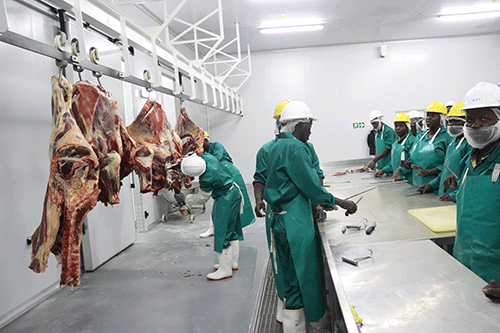RUNDU – The ministry of agriculture has handed over the Rundu abattoir to Meatco for operations. The facility, under construction since 2014, cost taxpayers N$170 million.
The facility has a slaughter capacity of between 80 to 120 cattle per day, and will additionally slaughter small stock at that capacity.
“This facility provides a market for livestock producers, not only in this region, but also from neighbouring regions. The benefits would, therefore, also accrue to farmers from Kavango West and Ohangwena,’’ said agriculture minister Calle Schlettwein during the handover to the operator yesterday.
“This event marks yet another important milestone in the development of our agricultural sector, and specifically the implementation of the Beef Value Chain Development Programme in the Northern Communal Areas (NCAs) of our country,” he noted.
On his part, Meatco CEO Mwilima Mushokabanji assured the ministry that the abattoir is in good hands. The Namibian beef industry is also well-received on the international market, and will not struggle an inch.
“Globally, competition is growing in terms of who can offer the best beef in the market. As we speak, today in Africa, Namibia is the only country that has met some of the most restricted import requirements, the best,’’ he beamed.
Mushokobanji said many African countries are trying, but they cannot meet those export requirements to make sure that their beef is accepted in the USA. For a country to meet the import requirements of these economies, it means they will need to have modernised infrastructure investments, systems and standards as well as need to make sure that their health and safety standards are the best.
“It’s not automatic that anyone can be able to export beef to these emerging economies, where you can maximise and generate more money. But as Namibia, we should be proud of the fact that we are able to exceed the expectations of import requirements of the USA,” he continued.
“Why are we meeting these requirements that no other African country is able to meet? Botswana can export to Europe, but can’t export to China. Namibia can,” he said.
Mushokobanji also applauded the Directorate of Veterinary Services (DVS) for their hard work, which makes Namibia meet strict import requirements of various international markets.
“I am emphasising this to give you an assurance that today you are handing over a modernised facility to an institution which has demonstrated experience in the management of agro-processing. This abattoir will be in good hands,” he reiterated.
The Meatco CEO said just like any other abattoir, the Rundu abattoir can only function positively when the relationship between the ministry of agriculture because they provide veterinary services, Meatco as a processing plant, and more importantly the famers and traditional authorities, is strong to make sure that they manage the abattoir competitively.
Kavango East governor Bonifatius Wakudumo indicated here that the opening of the Rundu abattoir will bring economic benefits, local meat supply, quality assurance, value-added services, waste management and knowledge-sharing opportunities to both the community and farmers. Its presence in Rundu not only supports the agricultural sector, but will contribute to the overall well-being, sustainability of the community and eventually the growth of the economy.
“However, for the benefits to be realised, it is once again my request to the Ministry of Works and Transport, the Road Fund Administration and the Roads Authority to consider opening and upgrading road networks in our two regions, especially in the inland, covering small-scale farming areas,’’ he urged.
The governor continued: “It is also worth reminding everyone that getting to the inland and especially to the small-scale farming units of the Kavango East requires a journey of a hundred miles, not necessarily because of the distances involved, but due to a lack of roads infrastructure. This means at the end of the day, animals will be exposed to unnecessary stress which will eventually reduce their selling prices, as well as higher transport costs for farmers”.



